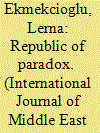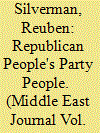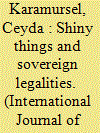|
|
|
Sort Order |
|
|
|
Items / Page
|
|
|
|
|
|
|
| Srl | Item |
| 1 |
ID:
156285


|
|
|
|
|
| Summary/Abstract |
This article will examine the interactions of Armenians and Jews as well as shared and dissimilar experiences in the Ottoman Empire and the Republic of Turkey from the early 20th century to the present to compare how affinities and differences in political outlook have affected their relationship. It has been stated at times in academia, by politicians, and members of the press that the Armenian and Jewish Diasporas have had similar historical experiences mostly through hardships. Despite that being the case, this article will show that throughout their experiences as non-Muslim minorities in the Ottoman Empire and the Republic of Turkey Armenians and Jews have never developed any coordinated collaboration; instead, they have pursued perceived respective ethnic interests, largely influenced by historical memory and geopolitics. At the same time, the Young Turks and later the Turkish state engaged in policies, especially toward non-Muslim minorities, that have been described as contradictory, ambivalent, or both in nature, influenced by changing perceptions of citizenship and identity as well as geopolitics.
|
|
|
|
|
|
|
|
|
|
|
|
|
|
|
|
| 2 |
ID:
134628


|
|
|
|
|
| Summary/Abstract |
This article focuses on the years after World War I, especially the first decade following the 1923 establishment of the Republic of Turkey, in order to analyze the position of minorities in the developing “we” of the new nation as projected by its political elite. Situating the discussion in the context of the League of Nations interwar minority protection regime, I demonstrate that the Treaty of Lausanne, which the Ankara government and the Allies signed in July 1923, played an important role in the conflicting treatment that minorities have since received in Turkey. The treaty's minority protection clauses entrenched divisions that had already been formed in the Ottoman Empire during the violence of the preceding decade, including the Armenian genocide. Moreover, reminding Turkish leaders of how 19th-century European imperial powers had used the cause of Ottoman Christians’ suffering as an excuse to infringe on Ottoman sovereignty, these clauses alarmed the Turkish political elite, especially as the “Great Powers” themselves were not bound by such minority protection guarantees. The goal of preventing a repetition of this unbalanced international power dynamic, which, according to the new Turkey's leaders, had led to the demise of the Ottoman Empire, engendered paradoxical policies toward non-Muslim Turkish citizens; they have been largely excluded from a Turkness (Türklük) to which they were sometimes included, even forcibly included.
|
|
|
|
|
|
|
|
|
|
|
|
|
|
|
|
| 3 |
ID:
165786


|
|
|
|
|
| Summary/Abstract |
Though it was the Democrat Party that governed Turkey from 1950 to 1960, and whose successes and excesses shaped the conditions of democratization, the previously ruling Republican People's Party played a crucial role as well. Drawing on newspapers, memoirs, and parliamentary debates, this article considers how the party's leaders and its young cohort of future leaders reacted to defeat, redefined themselves as members of the opposition, and contributed to a polarized political culture that persists today.
|
|
|
|
|
|
|
|
|
|
|
|
|
|
|
|
| 4 |
ID:
167968


|
|
|
|
|
| Summary/Abstract |
This article probes the legal expropriation of dynastic property in the late Ottoman Empire and early Turkish Republic. Focused on the period from Abdülhamid II's deposal in 1909 to the decade immediately following the abolition of the caliphate in 1924, it takes parliamentary debates as entry points for exploring how this legislative process redefined the sovereign's relationship with property. Although this process was initially limited only to Yıldız Palace, the debates that surrounded it heuristically helped to shape a new understanding of public ownership of property that was put to use in other contexts in the years to come, most notably during and after World War I and the Armenian genocide, before establishing itself as the foundation of a new ownership regime with the republican appropriation and reuse of property two decades later.
|
|
|
|
|
|
|
|
|
|
|
|
|
|
|
|
|
|
|
|
|